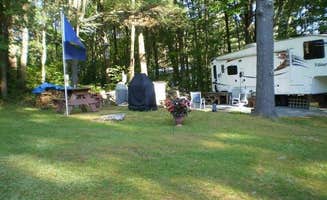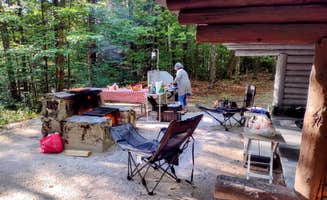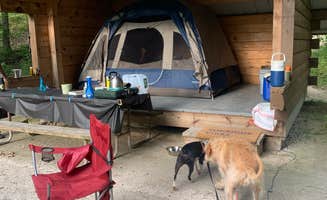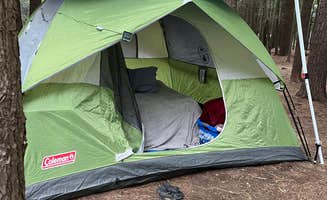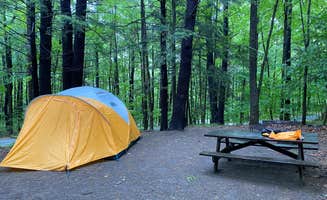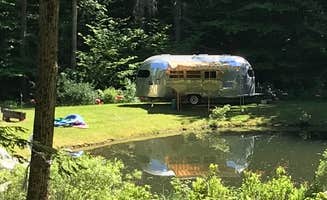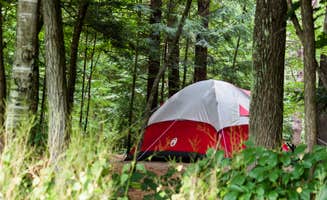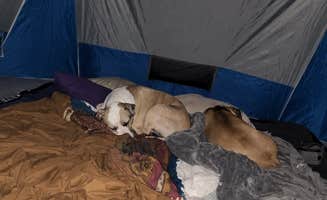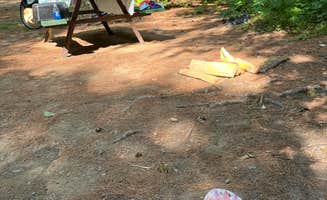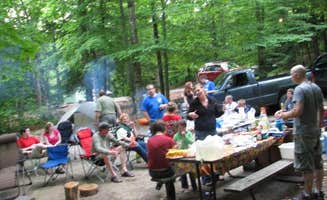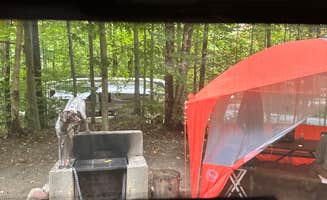Camping spots near Reading, Vermont range in elevation from 600 to 2,000 feet across the region's varied terrain. Winter closure typically begins after Columbus Day weekend, with many campgrounds reopening in early May when snow melt has subsided. Sites along ridgelines experience temperature drops of 10-15°F compared to valley locations, creating microclimates that affect camping conditions throughout the season.
What to Do
Hiking at Gifford Woods: Access the Appalachian Trail directly from Gifford Woods State Park Campground, where camping puts you steps from multiple trail options. "The Appalachian Trail runs right through the park and you can hike up to Deer Leep, around Kent Pond, or to Thundering Falls right from the campground," notes one visitor. Nearby hikes include trails to Killington and Pico peaks.
River paddling: Camp at Wilgus State Park Campground for direct Connecticut River access. "We rented kayaks and fished from the boat launch," shares a camper. The river current is gentle enough for upstream paddling, with shuttle services available from Great River Outfitters on select days.
Mountain biking: Camp at Mount Ascutney and access both beginner-friendly and challenging trails. "The state park maintains its own mountain biking trail loop, which is accessible directly from the campground. It is a 3 mile beginner friendly loop, with some nice rollers and moderate terrain," reports one visitor who explored the network.
What Campers Like
Lean-to sites: Coolidge State Park Campground offers sturdy lean-tos that provide protection from weather. "I highly recommend the lean-to's. The bathrooms were clean and the coin-operated showers were great. Each site was neatly maintained," writes one camper. Lean-tos are equipped with brooms for sweeping out debris.
Private, wooded sites: Mount Ascutney State Park Campground provides secluded camping among trees. "Due to the spacing between sites, and all the trees, it was quiet and peaceful. The campground couldn't have been more than a third full, but I bet it would still be quiet if it were more populated," notes a visitor who appreciated the privacy.
Clean facilities: Many campers note the well-maintained bathhouses. "Might be the nicest bathrooms I've seen in decades of camping," says a visitor to Quechee State Park. Showers typically require quarters, with rates around $1 for 10 minutes at most locations.
What You Should Know
Road noise concerns: Some campgrounds experience traffic sounds. "The road nearby is noisy. Because of its location, you can hear both the local highway and I91. If being in the quiet wilderness is important to you, than this campground might not work out," warns a camper about Tree Farm Campground.
Weather variability: Spring conditions often include mud and cooler temperatures, especially at higher elevations. "We had a great hike and lunch at top of mountain. Climbed weather tower and was an awesome experience," notes a visitor to Mount Ascutney, but conditions change rapidly.
Limited hookups: Quechee State Park Campground and most state parks don't offer electric hookups. "No Electric or hookups," confirms a reviewer, though dump stations are available at many locations. Expect rustic accommodations at state parks.
Tips for Camping with Families
Swimming options: Crown Point Camping Area provides family-friendly water access. "They have a lagoon for kids, with built-in water rafts in the middle for kids to jump in," reports one visitor. Most swimming areas lack lifeguards, so supervision is necessary.
Ranger programs: Several parks offer educational activities led by staff. "Rangers also run fun programs for children—my children churned butter and made popcorn over the campfire one night, and made tie dyed T-shirts the next (for no fee)," shares a parent who camped at Quechee State Park.
Field space for play: Look for campgrounds with open areas. At Coolidge State Park, one site has "direct access down a path to a large recreation field that included a volleyball net. Our children and their friends loved biking around the field and exploring it while waiting for meals," notes a family.
Tips from RVers
Size restrictions: Many state parks have limited capacity for large rigs. "You have to go down a small hill and bottom out the front and then drag the backend out of the dirt. This campground is not big rig friendly," warns a camper about Caton Place Campground.
Leveling challenges: Prepare for uneven terrain at some sites. "The RCA on the sites probably could have spread out better and made more level. Also tough to drive a stake into," mentions a visitor to Quechee State Park regarding site conditions.
Full-hookup options: For those needing connections, Quechee-Pine Valley KOA offers more amenities than state parks. "The park is a large park that is terraced since it is in a pretty hilly area. There is the range of sites from pull-thrus, pull-ins and back-in sites and can accommodate RVs of any size. Some sites are full hookup while others are not," explains an RVer who stayed for five nights.


